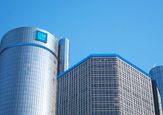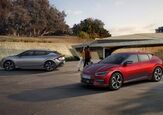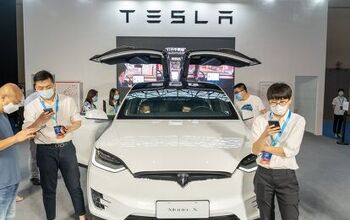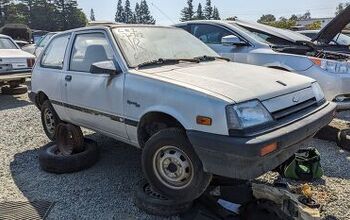Tesla Dodges Chinese Tax, Raises Prices

With a 25-percent import tariff looming like a hanging blade over U.S.-built vehicles in the Chinese market, Tesla has managed to side-step another sales-sinking levy: the country’s purchase tax.
At 10 percent, the purchase tax applies to most vehicle sales in that market, though the state exempts various domestic “new energy” (electric) vehicles from the added cost. As of Friday, Tesla vehicles, despite being manufactured in California, will join the ranks of these privileged automobiles. However, buyers hoping to realize the full benefit of the tax cut are out of luck.
Gaining exemption from the purchase tax will not save Tesla from the 25-percent tariff on U.S. vehicles that China plans to enact on December 15th. The tariff is a direct response to a U.S. threat — a tax-for-tax measure as the two countries engage in a trade war jousting match.
While Tesla vehicles (specifically, the Model 3) built at the automaker’s in-progress Shanghai Gigafactory would handily side-step the import tariff, that factory has yet to build its first vehicle. Its completion date is unknown, though CEO Elon Musk has previously claimed the facility will be up and running before the end of the year.
With tariffs looming, sticker prices are on the rise.
Due to the country’s falling currency, Friday also brought a price hike for all three Tesla models sold in the Chinese market. As reported by Bloomberg, the Model 3 sees a 2-plus-percent increase, with the sedan now starting at $50,900 for a base model. A Model S, now available only in top-spec guise? That’ll be $111,000. The Model X SUV sees its price floor rise to roughly $113,255. Motoring for the masses, these vehicles ain’t.
News of the purchase tax exemption saw Tesla shares briefly rise nearly 5 percent in pre-market trading. With the opening bell minutes away, the company’s stock is still up 3 percent.
[Image: Tesla]

More by Steph Willems
Latest Car Reviews
Read moreLatest Product Reviews
Read moreRecent Comments
- Clark The Ring (Nürburgring) is the only race track I've driven on. That was 1985 or 1986 with my '73 Fiat Spider (and my not-so-happy girlfriend). So I made the Karussell (today: Caracciola Karussell, which I believe the author meant; there is another one: Kleines Karussell).
- AZFelix This article takes me back to racing electric slot cars with friends on tracks laid out in the basement. Periodically your car would stop due to lost connections or from flying off the track and you would have to dash over to it and set it right. In the mean time your competitor would race ahead until faced with a similar problem. It seemed like you were struggling harder to keep from losing than trying to win. Fun times.“History never repeats itself, but it does often rhyme.” Mark Twain
- MaintenanceCosts What Americans get told (a) vs. actual EV ownership experience (b)(and, yes, I am an actual EV owner)a. You'll be waiting indefinitely for slow chargersb. Nearly all of your charging happens while you're at your housea. EVs are prohibitively expensive toys for the richb. Fuel cost is 1/4 that of gas and maintenance about the same, with purchase price differences falling quicklya. EVs catch fire all the timeb. Rates of ICE vehicles catching fire are much higher, although the few EV fires can be harder to extinguisha. You can't take a road tripb. Road trips are a bit slower, but entirely possible as an occasional thinga. iTz A gOlF cArT!!1b. Like a normal car, but with nicer power delivery and less noise
- Pete Skimmel We bought a last year 2015 model XB as a leftover new car at our local Toyota dealer in early 2016. Stupidly cheap at about $18,500 out the door (no sales tax in Oregon), it has an automatic and the usual amenities. It's been a great around town car that my wife hopes to keep until they pry her cold senile hands from the steering wheel in about 20 years. When we occasionally carry adult passengers in the back seat they are always in awe at the space in this smaller vehicle. Now approaching 49k miles on the clock, our out of pocket costs have been wiper blades, a set of decent tires and routine oil changes that I do in the garage. It consumes zero oil between changes. Yes, it's an appliance, but a very serviceable one.
- Slavuta "The 4,861-pound curb weight" -- poor tires"on track, this application sounded pretty good" -- can they make it sound like Hemi?

































Comments
Join the conversation
It's 8% here in Philly. When I got my Audi, I did not receive the tags for it in a timely manner, and it turned out that the out-of-state dealer had not charged me the correct percentage for a Philadelphia resident, so PA would not send the plates. The dealer was apparently too embarrassed to tell me of their mistake, but I just sent them a check for the difference - it was not like the dealer was making any extra money off of it.
"Gaining exemption from the purchase tax will not save Tesla from the 25-percent tariff on U.S. vehicles that China plans to enact on December 15th. The tariff is a direct response to a U.S. threat — a tax-for-tax measure as the two countries engage in a trade war jousting match." No. The 25% tariff is *NOT* in response to US trade fight, it predates Trump. China has had this large tariff for many years in additional to local-partner requirements. The case of Tesla is a poster child for China's trade-war strategy. Sure we buy toasters from China the argument goes - US should specialize in advanced products. Tesla's *are* in demand in China - and could compete in upper end of market, even with currency rates and US production. but essentially China forced China to build a factory in China. Also note China makes 60% of the world's Li batteries but still hoovered up their own gigafactory as part of the deal.